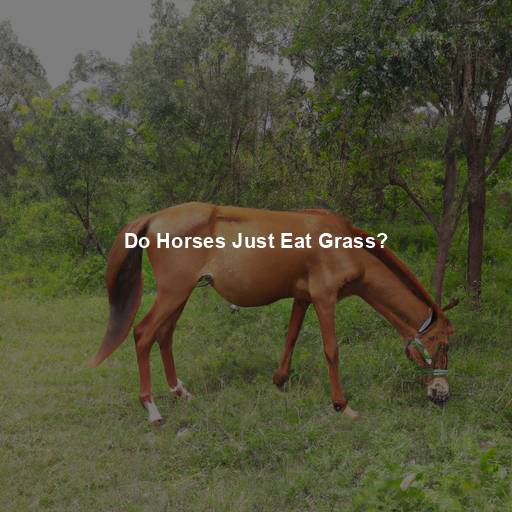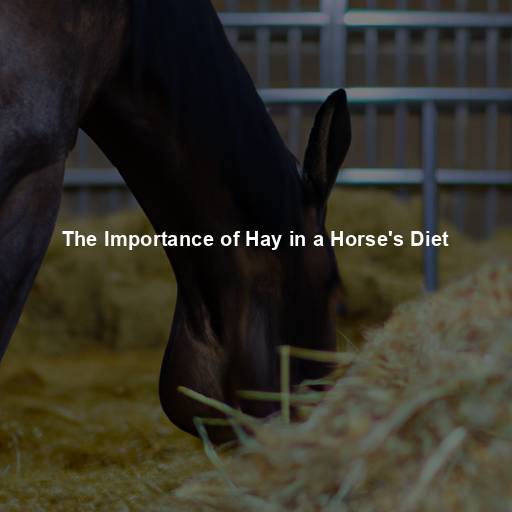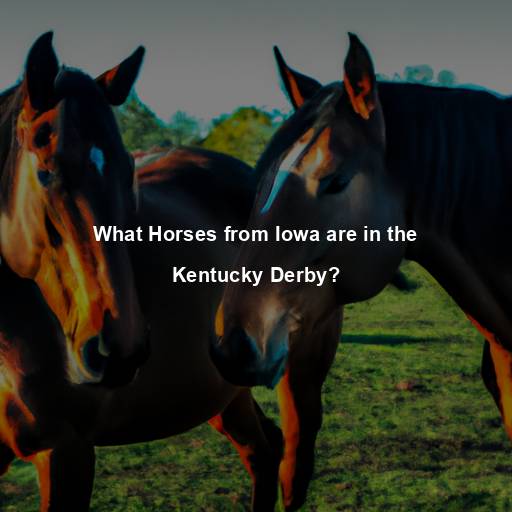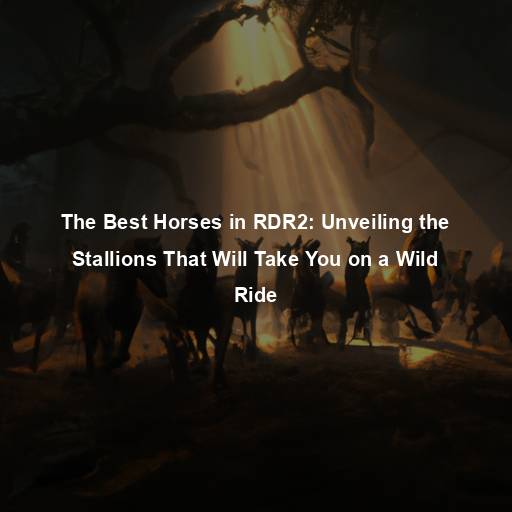Do Horses Just Eat Grass?
Last Updated on July 19, 2023 by Evan
Contents
- 1 The Diet of Horses: Beyond the Grass
- 1.1 The Natural Grazers: Grass as the Foundation
- 1.2 Essential Nutrients: Protein, Carbohydrates, and Fats
- 1.3 The Role of Forage and Roughage
- 1.4 Concentrates: Balancing the Diet
- 1.5 Water: The Essential Lifeline
- 1.6 Special Considerations: Age, Activity, and Health
- 1.7 The Importance of Balanced Nutrition
- 1.8 Enhanced Nutritional Profile
- 1.9 Improved Digestive Health
- 1.10 Preventing Nutritional Deficiencies
- 2 Understanding the Challenges of Dietary Diversification
- 3 Embracing a Holistic Approach to Horse Nutrition
- 4 Exploring the Environmental Impact of Horse Diets
- 5 FAQs – Do Horses Just Eat Grass?
The Diet of Horses: Beyond the Grass
Throughout history, horses have served as awe-inspiring partners to humanity, captivating our hearts with their majestic presence. Yet, beyond their graceful demeanor lies a perplexing truth: while grazing upon grass holds undeniable significance in their dietary habits, horses require a more nuanced menu to sustain their vitality. Straying away from the conventional narrative that pegs horses as solely grass consumers, we shall delve into the intricacies of their nutritional needs, unraveling the synergy between their voracious appetites and diverse sustenance requirements. Prepare to be enthralled as we embark on a journey to demystify the enigmatic realm of equine nourishment.
The Natural Grazers: Grass as the Foundation
Horses are natural grazers, meaning that their digestive systems are designed to process a constant supply of forage. Grass, rich in fiber, serves as an essential component of their diet. It provides horses with energy, vitamins, and minerals necessary for their daily activities. However, relying solely on grass may not fulfill all their nutritional requirements.
Essential Nutrients: Protein, Carbohydrates, and Fats
Horses also need a sufficient amount of protein, carbohydrates, and fats in their diet. Protein is crucial for muscle development and repair, while carbohydrates provide the necessary energy for physical exertion. Fats, on the other hand, serve as concentrated sources of energy for horses. Including these nutrients in their diet ensures that horses can maintain their overall health and perform at their best.
The Role of Forage and Roughage
Apart from grass, horses require other forms of forage and roughage to meet their dietary needs adequately. Forage can include hay, which is dried grass, or other plants such as alfalfa. These sources of forage provide horses with additional fiber, vitamins, and minerals. The roughage aids in maintaining proper digestion and prevents digestive issues such as colic.
Concentrates: Balancing the Diet
When it comes to feeding horses, it’s not just about the hay and grass. Sometimes, they need a little something extra to keep things in balance. Enter concentrates, the secret weapon in a horse’s diet. These specially formulated feeds, chock-full of essential nutrients, are like a magic potion for our equine friends.
Water: The Essential Lifeline
While it may seem obvious, it is worth mentioning that water is a critical component of a horse’s diet. Horses require a constant supply of clean, fresh water to maintain hydration and support various bodily functions. Without access to water, horses can become dehydrated, leading to serious health issues.
Special Considerations: Age, Activity, and Health
The dietary needs of horses can vary based on their age, activity level, and overall health. Young, growing horses require additional nutrients for proper development, while pregnant or lactating mares have increased nutritional demands. Horses involved in intense physical activities, such as racing or competitive sports, may require specific diets tailored to their energy requirements. Additionally, horses with health issues may need specialized diets prescribed by veterinarians.
The Importance of Balanced Nutrition
Caring for our majestic equine companions involves considering their diet, a delicate juggle of nutrients tailored for their optimal health. With the delicate balance of vitamins, minerals, and proportions, the complexity of providing these magnificent creatures with a well-rounded feast is anything but simple. Seeking guidance from seasoned equine nutritionists and veterinarians becomes an essential stepping stone, guaranteeing that our horses graze upon the most nourishing sustenance suited to their specific needs. In this bewildering world of equine nutrition, consulting the experts ensures our beloved companions thrive.
Enhanced Nutritional Profile
When it comes to giving our equine friends the best possible nutrition, the secret lies in the diverse and enigmatic world of food. By embracing a wide range of tantalizing options, we unlock the potential for unparalleled nourishment. An assortment of hay and concentrates holds the key to unlocking a plethora of essential nutrients, each with its own unique allure. Just like a culinary adventure, grass hay beckons with its fibrous charm, while legume hay, such as the alluring alfalfa, seduces with its captivating protein content.
Improved Digestive Health
Have you ever wondered how to keep your horse’s digestive system in top shape? Well, it turns out that a diverse diet might just be the answer. By offering a wide range of forages, you can ensure that your equine companion maintains a healthy gut and avoids pesky issues like colic or digestive disturbances. What’s even more intriguing is that the different textures and flavors of these foods actually stimulate chewing, contributing to proper digestion and the production of saliva.
Preventing Nutritional Deficiencies
When it comes to horses, putting all their nutritional eggs in the grass basket may leave them feeling a bit under the weather. While grass has its benefits, it might not pack enough punch in terms of vital nutrients. The savvy horse owners out there know that by serving up a smorgasbord of different foods, they can keep their trusty steeds in tip-top shape with all the vitamins, minerals, and trace elements they need to thrive.
Understanding the Challenges of Dietary Diversification
Digestive Sensitivities
When it comes to spicing up a horse’s menu, it’s important to tread lightly and be mindful of their unique digestive system. Just like humans with dietary restrictions, some horses may have specific dislikes or sensitivities when it comes to certain foods. So, if you’re planning to introduce new culinary delights to your equine companion, take it slow and keep a watchful eye on how they react, making sure they don’t suffer any unexpected tummy troubles.
Balancing Caloric Intake
When it comes to nourishing our equine friends, it is crucial to take a multifaceted approach. The key lies in understanding the intricate dance between calories and consumption. From the hay they munch on to the concentrates they savor, these dietary delicacies can pack varying amounts of energy. Horse owners must carefully calculate their majestic companions’ unique energy needs, factoring in their age, activity level, and overall well-being.
Cost and Availability
When it comes to adding variety to a horse’s diet, there’s a whole new world of considerations to ponder. The cost and accessibility of different foods can throw us into a whirlwind of perplexity. Certain regions may pose a challenge when it comes to procuring specific forage or concentrates. So, as conscientious horse owners, we must delicately balance the complexity of incorporating diverse food options while keeping our equine companions’ nutritional needs front and center.
Monitoring Nutritional Balance
When it comes to nourishing our equine companions, maintaining a healthy nutritional balance can often feel like navigating a maze of complexities. Monitoring the delicate harmony between various forage and concentrates is a vital step in ensuring that our horses receive the necessary nutrients they deserve. Seeking the sage advice of equine nutritionists or trusted veterinarians can offer valuable insights into crafting a truly balanced diet that leaves no room for uncertainty.
Embracing a Holistic Approach to Horse Nutrition
Consulting with Professionals
When it comes to taking care of our beloved horses, seeking expert guidance in equine nutrition is paramount for their overall well-being. Consulting with equine nutritionists or experienced veterinarians who specialize in this field can help tailor personalized dietary plans that cater to the unique needs of every individual horse. These professionals not only provide valuable advice but also play a crucial role in monitoring and fine-tuning the horse’s diet, ensuring that it remains as nourishing and beneficial as possible.
Regular Health Assessments
In addition to a diverse diet, regular health assessments are crucial for horses. Routine veterinary check-ups can help identify any underlying health issues that may affect their dietary requirements. These assessments allow for early intervention and adjustments to their nutrition plan, ensuring continued well-being.
Observing Behavioral and Physical Indicators
Horse owners should be attentive to behavioral and physical indicators that may suggest nutritional imbalances. Changes in appetite, weight loss or gain, dull coat, and changes in energy levels can all be signs of inadequate nutrition. By closely observing these indicators, horse owners can make necessary adjustments to their horse’s diet in a timely manner.
Building a Strong Foundation
A diverse diet is just one aspect of overall horse care. Providing a clean and safe living environment, regular exercise, and proper grooming are all essential components of maintaining a horse’s well-being. By focusing on a holistic approach to horse care, owners can ensure that their horses thrive in all aspects of their lives.
Enhanced Immune Function
Did you know that what a horse eats can actually have a lasting impact on its immune system? It turns out that a diverse diet, packed with a wide range of nutrients and antioxidants, can work wonders in strengthening their immune response and protecting them from pesky infections and diseases. So, if you want to ensure your beloved horse stays healthy and steer clear of illnesses, make sure to provide them with a thoughtfully varied menu. After all, a well-nourished immune system lays the foundation for overall well-being, and we all want the best for our majestic four-legged friends, don’t we?
Promoting Joint Health
When it comes to keeping our horses happy and healthy, joint health is certainly not something to overlook. But what if I told you that certain foods can actually play a role in supporting those joints? Yes, you heard it right! Foods like flaxseed and fish oil, packed with omega-3 fatty acids, can work wonders for our equine friends.
Supporting Skin and Coat Health
When it comes to our equine friends, a little variety can go a long way in keeping their skin and coat at their best. Think omega-6 fatty acids, found in sources like sunflower seeds and soybean oil, to give that glossy glow and combat pesky skin troubles like dryness and itching. But let’s not forget the power of a well-rounded menu, packing in all those crucial vitamins and minerals that make for strong and luscious manes. So, feed them right and watch them shine, inside and out!
Improving Muscle Development and Recovery
When it comes to giving your equine companions the fuel they need to reach peak performance, proper nutrition takes the reins. Building and repairing muscles can be a perplexing task, but fear not, for your horse’s strength lies in the power of protein. Incorporating nourishing foods like alfalfa, bursting at the seams with muscle-loving protein, can give those high-demand athletes the edge they need in the competitive arena. Remember, a variety of delectable options, including protein-rich forages and concentrates, can pave the way for a robust muscular masterpiece.
Exploring the Environmental Impact of Horse Diets
Sustainable Foraging Practices
Who would have thought that something as simple as grass could hold the key to sustainability for our equine friends? It turns out that by embracing a rotational grazing system and adopting smart pasture management techniques, we can ensure the long-term health and longevity of our grasslands. Not only does this benefit the horses themselves, but it also has a positive impact on the environment, reducing the need for the production and transportation of alternative forage options. It’s a win-win situation that taps into the natural wonders of the world around us.
Efficient Nutrient Utilization
Horses have evolved to efficiently utilize the nutrients found in grass and other forages. Their digestive systems are adapted to break down fibrous materials and extract nutrients effectively. By providing horses with a diverse diet that includes a variety of forages and concentrates, horse owners can maximize nutrient utilization and minimize waste.
Minimizing Waste and Environmental Pollution
Diversifying a horse’s diet can help minimize waste and reduce the environmental pollution associated with manure management. When horses consume a diverse range of foods, their manure becomes less concentrated and more balanced in terms of nutrients. This improves the quality of manure and makes it easier to manage and utilize as a natural fertilizer.
Supporting Local Agriculture
Incorporating a diverse range of forages and concentrates into a horse’s diet can support local agriculture. By sourcing locally grown foods, horse owners can contribute to the local economy and reduce the carbon footprint associated with long-distance transportation. Supporting sustainable farming practices benefits both the environment and the local community.
FAQs – Do Horses Just Eat Grass?
What do horses eat in general?
While it is true that horses are herbivores, their diets extend beyond just consuming grass. Horses consume a variety of plant materials, including hay, grains, and sometimes even fresh fruits and vegetables. The specific dietary requirements of a horse will depend on factors such as its age, weight, activity level, and overall health. It is essential to provide horses with a balanced and nutritionally adequate diet to ensure their well-being and performance.
Can horses survive on grass alone?
When it comes to horses and their dietary needs, the grass is not always greener on the other side. While it may seem like a simple solution, relying solely on grass can leave our equine friends lacking in essential nutrients. This goes beyond just the type of grass and the quality of soil it grows in; other factors such as environmental conditions also come into play. It gets even trickier for horses with high energy demands, like those in the performance arena or expecting mares. To truly keep them in top form, we must explore the realm of supplements and additional feed to give them the well-rounded nourishment they need for optimal health and performance.
Why is grass an important part of a horse’s diet?
Grass is a natural and important part of a horse’s diet. It provides essential fiber, vitamins, and minerals required for their digestive system and overall well-being. Grazing on grass also allows horses to exercise their jaw and promotes natural foraging behaviors. Ideally, horses should have access to fresh, well-maintained pasture, which not only provides nutrition but also offers mental stimulation and the opportunity for social interaction with other horses.
Can horses overeat on grass?
There is something enchanting about the sight of horses, gracefully grazing on vast green meadows. Yet, as captivating as this image may be, we cannot dismiss the challenges that come with the horses’ insatiable appetites. You see, these majestic creatures possess a voracious desire to consume copious amounts of grass, which, if left unchecked, can result in a host of perplexing predicaments. From excess weight and digestive turmoil to the looming threat of laminitis, the consequences of overindulgence in the green pastures cannot be ignored. Therefore, it becomes imperative for us, as responsible caretakers, to navigate the labyrinthine landscapes of equine dietary management. Fortunately, through the implementation of rotational grazing, the use of grazing muzzles, or the judicious control of pasture time, we can engage in this delicate dance between satisfying their innate craving while safeguarding their well-being.
What other factors should be considered when feeding horses grass?
When providing horses with grass, it is important to consider their individual needs and any special dietary requirements. Age, breed, weight, and health conditions should all be taken into account. Additionally, the quality and safety of the pasture should be evaluated regularly. Ensuring that the grass is free from harmful plants, pesticides, or excessive fertilization is vital for the well-being of the horse. Regular veterinary check-ups and consultations with equine nutritionists can help create a suitable feeding plan tailored to a horse’s specific needs.
Are there any risks associated with horses consuming grass?
While grass is a natural food source for horses, there are certain risks involved. Some grasses, such as those infected with endophyte fungi, can cause various health problems. Ingesting certain toxic plants commonly found in pastures can also be detrimental to a horse’s health. It is important to be aware of potential hazards and regularly inspect pastures for any signs of dangerous plants. Consulting with an equine specialist or agricultural extension agent can be valuable in identifying and managing potential risks associated with feeding horses grass.






